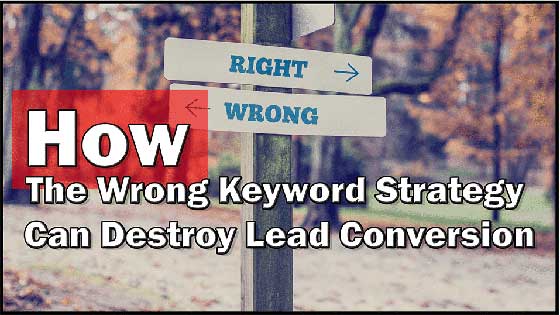Your keyword strategy is a cornerstone of your inbound marketing program. It helps you to coordinate your online content across your website and social media profiles, ties in your search engine marketing with your organic search results and gets you found among customers who are looking for your product and service. That’s IF you get it right. If you get the strategy wrong, however, it can actually do the opposite—destroy your lead conversion efforts completely!
Table of Contents
ToggleWhen is a Keyword Strategy Wrong?
Your keyword strategy is unlikely to deliver the results you want if any of these criteria apply:
- It’s not well researched
- You’re using mainly highly competitive keywords
- It doesn’t include long-tail keyword phrases
- You haven’t researched your competitors and what they’re doing—a primary mistake among marketers, according to HubSpot
- You’re trying to rank for too many—or too few—keywords
- Your keywords don’t focus on profitable terms for your industry
- You don’t monitor changes in search trends regularly
- You aren’t reviewing and adjusting your keyword strategy periodically
- You haven’t build buyer personas and matched those keywords to those personas
- You haven’t segmented keywords into informational, transactional and directional “buckets”
In addition, a keyword strategy that doesn’t incorporate concepts such as semantic search will be unlikely to deliver much in the way of results, according to Search Engine Watch.
What Are the Consequences?
All these actions can cause your keyword strategy to be less than effective. We took a look at the way in which each action (or lack of it) impacts your lead conversion:
Inadequate Research
Doing keyword research enables you to identify the search terms your target audience is most likely to use when looking for your product or service. You’ll discover the actual words and terms people use when they talk about the problem your product solves.
Research also helps you turn up more obscure search terms that you’re less likely to think of initially, but which could generate more website traffic because they have lower competition (we’ll say more about that issue later). The better your traffic, the higher your number of leads and the earlier you’ll achieve a return on your marketing investment.
Without adequate research, therefore, not only can you expect to be using the wrong keywords and losing leads, but you’ll waste money, too. Instead of focusing on keywords that deliver results, you’ll be spending resources and cash on words that don’t result in conversions.
Using the Wrong Keywords
The whole point of a keyword strategy is to improve your ranking in search, so more people will find your website. That’s not going to happen when your listing comes up on page 973,000, is it? Take “marketing” for example: Google turns up 1.7 billion results for the word, and the users could be searching for marketing products, services, lessons, news or campaigns, among dozens of other options!
Ok, that’s what you call a really high competition keyword, and the higher the competition the lower your ROI. By reviewing all the related keywords that turn up in your research, however, you can identify lower competition keywords and phrases that are being used by far fewer marketers. Those exponentially increase your chances of being found in the results, because not as many people are searching for them.
In the past, a keyword strategy typically focused on keywords with the highest search volume, and downplayed attributes such as relevance and competition. That’s no longer the case according to Forbes.com, and a strategy that does so is likely to gradually slow down the number of leads you convert from your website until very few are coming in.
Skipping Testing and Evaluation
You’d be surprised at the number of companies that do excellent keyword research and even halfway good content marketing, but they stop short of including testing and evaluation in their keyword strategy!
But, here’s the thing: No strategy is complete without specific deliverables against which to measure its progress. Even having benchmark criteria in place is no guarantee of success, either, and unless your strategy includes a thorough performance evaluation you’re minimizing your chances of getting good lead conversions.
But that can’t be, you say. Our strategy covers all the right touch points for research and implementation, it’s well funded and it’s working, you say. Is it? Is it really working as well as it could be, and if so, how do you know that? Or are you just assuming that because you get some lead conversions, the strategy is a success? Here’s the rub: for many marketers, their keywords become permanent fixtures in their lives, according to Search Engine Land.
Many business owners and C-Suite execs compile a list of words associated with their brand and expect marketers to use those time and again in their content marketing. Sure, the leads come in. Certainly, there are conversions. But are those words continuing to perform, day after day and month after month? Can you track them through both your organic and paid search, all the way to the final step in your lead conversion process?
If you can’t answer these questions conclusively, you might have the wrong keyword strategy in place. Ditch the poorly performing keywords and replace them with well-researched, comprehensive ones.
Overlooking Other Players
A keyword strategy that ignores what your competitors are doing is destined for failure. Analyzing the key terms and methods used by other players in your industry is crucial if you want to maximize the number of leads you get from your site. With the wrong keywords, you’ll be missing out on capturing market share, or failing to target the audience with the terms your opposition is using.
One of the main reasons you use keywords in the first place is to improve your ranking in organic search, and 2014 research from Moz.com shows that 67.6% of click throughs go to websites that appear in the top 5 spots on Google. So if you aren’t targeting the same keywords as those in the first three positions, you’re effectively giving away the traffic to the companies that do.
Getting it Right
Ok, enough about what happens if you get it wrong. Instead, let’s look at what’s needed to get it right. Apart from the points raised so far, there are other things you can do to ensure that your keyword strategy is sound:
Focusing on Profitable Terms
Find out which keywords actually result in conversions. You can get this kind of information by implementing content marketing with closed-loop analytics such as the HubSpot methodology, or working with an experienced marketer who has access to the software and systems needed to provide the information.
Having a Mix of Keyword Types
Some keywords are harder to rank for than others. That’s no reason not to include them in your strategy, though; the secret to achieving continual improvement in your search rankings is to have an even spread of keywords at all levels of difficulty. Target terms with low search volume and low competition such as long-tail keywords to drive highly qualified traffic, while simultaneously working at improving your rank for the commonly used words that have high search volumes.
Staying Up-to-Date on Search Trends
No matter how good your keyword strategy is, if Google makes significant changes to its algorithm it can throw you off kilter overnight. Don’t sit back and wait to be surprised by a drop in lead conversions; make a point of keeping up with trends in the world of search engines so you can adapt as quickly as they change.
A Matter of Semantics
These days, it’s important to take note of the trend towards semantic search, which is the way search engines work to not only find the keywords, but to understand what the user is searching for. To do so, the algorithm has to take into account the context of the search query. This is where your long-tailed keywords come into play—they provide a concept or a clue for the algorithm, instead of simply giving a single word.
The Final Word
From all this data, it’s clear that a keyword strategy is much more than simply identifying the primary words that describe your product or service and stuffing them onto your website somewhere. It’s essential that your strategy is well thought-out, researched, refined and tested.
You also need spend the time required on keeping up with changing trends, evaluating your strategy’s performance and making the adjustments necessary to ensure your content continues to deliver results.
So, how successful are YOUR keywords proving to be, based on the number of leads you get? Are you unwittingly destroying your conversion opportunities by having the wrong strategy in place?











